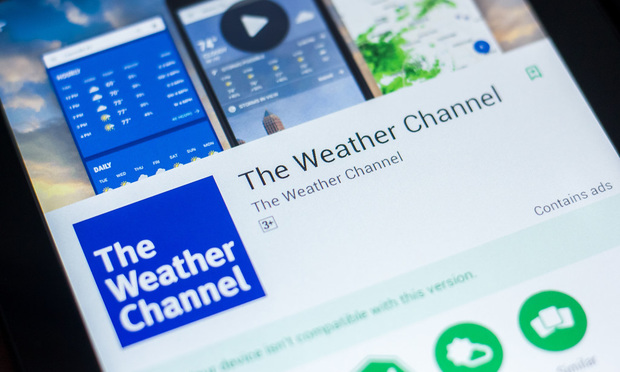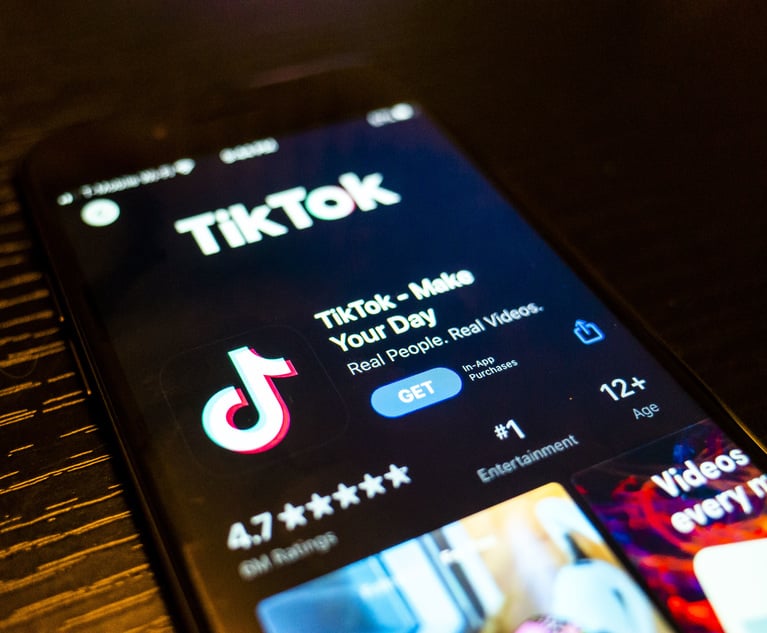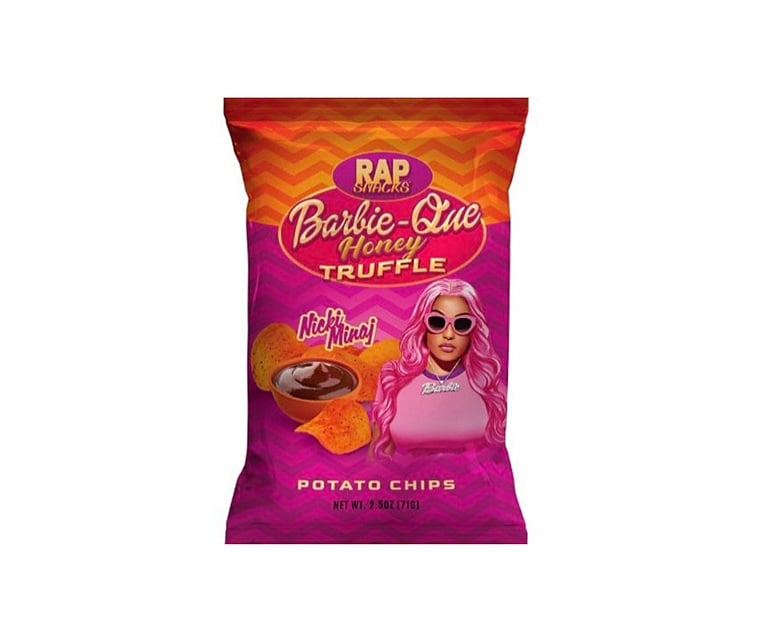Weather Channel App Dilemma: When Is a Disclosure Really a Disclosure?
The city of Los Angeles alleges the Weather Channel app does not adequately disclose its sale of geolocation data to third-party advertisers, raising questions on the expectations of consumers.
January 15, 2019 at 04:45 PM
5 minute read
The original version of this story was published on Legal Tech News
 The Weather Channel mobile app.
The Weather Channel mobile app.
If you really want to know what's going on with the weather, it might be less complicated just to look out the window. The city of Los Angeles has filed a complaint against TWC Product and Technology LLC, alleging that the company's Weather Channel app does not sufficiently disclose to users that it sells their geolocation data to advertisers.
The interesting wrinkle there is that the app does disclose the practice, in terms located in the middle of a much larger and separate privacy policy that users have to actively seek out.
Exactly how much consumer legwork is too much consumer legwork is an area that's been largely untouched by the law. But with less than a year to go until the California Consumer Privacy Act (CCPA) comes into force, that gray area could find itself getting pushed closer to black and white.
“I think this is going to be another further development of the law to see what actually does the court do here,” said Jonathan Blavin, a partner in the San Francisco office of Munger, Tolles & Olson. “Does it find those privacy policy disclosures sufficient—and there may be disclosures in other places that the Weather Channel can point to in litigating the case—or does there need to be more here from the perspective of notice and consent?”
A complaint filed recently with the California Superior Court frames the suit within the context of the state's Unfair Competition Law, alleging that TWC engaged in unfair and fraudulent business practices by deceiving users into allowing its app to collect geolocation data.
The sin described here is one of omission. In other words, if users had been notified that the data could wind up in the hands of advertisers as part of the initial permission request, there's a chance they may not have consented in the first place.
“I could certainly see, and I'm sure … Los Angeles will argue, that in analyzing the question of fairness it's not simply sufficient to look at the privacy policy. They're going to argue that you should look at regulatory agencies, how regulations are analyzing this question to see whether or not this is a fair business practice,” Blavin said.
A spokeswoman for The Weather Company, which owns TWC Product and Technology LLC and has been a subsidiary of IBM since a 2016 deal, provided this statement: ”The Weather Company has always been transparent with use of location data; the disclosures are fully appropriate, and we will defend them vigorously.”
(The Weather Company no longer owns The Weather Channel television network, but both continue to be based in Atlanta.)
One of the most prominent regulations on the subject happens to be the forthcoming CCPA, scheduled to take effect on Jan. 1, 2020. Under that law, there would have to be a link or button located conspicuously in the app that allows users to opt out of having their data sold.
Tanya Forsheit, chairwoman of the privacy and data security group at Frankfurt Kurnit Klein & Selz, thinks there's a chance that Los Angeles City Attorney Michael Feuer is using the Weather Channel app complaint as a test case or dry run before the CCPA's arrival.
“They want to see if they can do this even just under the unfair practices act, even without all of these other laws,” Forsheit said.
According to her, a company relegating disclosures to its privacy policy is not an uncommon practice. The Weather Channel app may have emerged as an attractive target for a suit thanks to its inclusion in a December report by The New York Times examining how businesses process the geolocation data they collect.
For Los Angeles, a successful case might hinge on whether a judge decides that omitting any mention of advertisers from the initial data request is misleading in a way that harms consumers.
“To me, you've got a significant challenge because there's nothing in the law that says that in order to be conspicuous, you have to put it right there when the push comes to say, 'Can we track your location information?' What the law says is that it has to be in the privacy policy, and it's in the privacy policy,” Forsheit said.
Even if The Weather Channel app prevails, don't expect the issue to become a moot point for businesses and the lawyers who represent them. Public awareness regarding their personal data and its handling continues to spike, and with that comes new sensitivities to maneuver.
Forsheit and her firm often talk generally about such areas with their clients. In those instances it may not be about the law so much as, how creepy is too creepy?
“Creepy is not illegal by the way. It's not a legal term. But it is a very important question today when we look at how businesses use information and whether it's something that's going to turn consumers against them,” Forsheit said.
Daily Report Managing Editor Jonathan Ringel added reporting to this article, which ran initially in Legaltech News, a Daily Report affiliate.
This content has been archived. It is available through our partners, LexisNexis® and Bloomberg Law.
To view this content, please continue to their sites.
Not a Lexis Subscriber?
Subscribe Now
Not a Bloomberg Law Subscriber?
Subscribe Now
NOT FOR REPRINT
© 2025 ALM Global, LLC, All Rights Reserved. Request academic re-use from www.copyright.com. All other uses, submit a request to [email protected]. For more information visit Asset & Logo Licensing.
You Might Like
View All
'Cradle to Grave': Children's Clothing Company Carter's Sued in Digital Privacy Class Action

Atlanta Capital Recruiter Awarded $10M for Unpaid Commissions by Blockchain Company


Nicki Minaj 'Barbie-Que' Chips Are Giving Mattel IP Nightmares
Trending Stories
- 1How ‘Bilateral Tapping’ Can Help with Stress and Anxiety
- 2How Law Firms Can Make Business Services a Performance Champion
- 3'Digital Mindset': Hogan Lovells' New Global Managing Partner for Digitalization
- 4Silk Road Founder Ross Ulbricht Has New York Sentence Pardoned by Trump
- 5Settlement Allows Spouses of U.S. Citizens to Reopen Removal Proceedings
Who Got The Work
J. Brugh Lower of Gibbons has entered an appearance for industrial equipment supplier Devco Corporation in a pending trademark infringement lawsuit. The suit, accusing the defendant of selling knock-off Graco products, was filed Dec. 18 in New Jersey District Court by Rivkin Radler on behalf of Graco Inc. and Graco Minnesota. The case, assigned to U.S. District Judge Zahid N. Quraishi, is 3:24-cv-11294, Graco Inc. et al v. Devco Corporation.
Who Got The Work
Rebecca Maller-Stein and Kent A. Yalowitz of Arnold & Porter Kaye Scholer have entered their appearances for Hanaco Venture Capital and its executives, Lior Prosor and David Frankel, in a pending securities lawsuit. The action, filed on Dec. 24 in New York Southern District Court by Zell, Aron & Co. on behalf of Goldeneye Advisors, accuses the defendants of negligently and fraudulently managing the plaintiff's $1 million investment. The case, assigned to U.S. District Judge Vernon S. Broderick, is 1:24-cv-09918, Goldeneye Advisors, LLC v. Hanaco Venture Capital, Ltd. et al.
Who Got The Work
Attorneys from A&O Shearman has stepped in as defense counsel for Toronto-Dominion Bank and other defendants in a pending securities class action. The suit, filed Dec. 11 in New York Southern District Court by Bleichmar Fonti & Auld, accuses the defendants of concealing the bank's 'pervasive' deficiencies in regards to its compliance with the Bank Secrecy Act and the quality of its anti-money laundering controls. The case, assigned to U.S. District Judge Arun Subramanian, is 1:24-cv-09445, Gonzalez v. The Toronto-Dominion Bank et al.
Who Got The Work
Crown Castle International, a Pennsylvania company providing shared communications infrastructure, has turned to Luke D. Wolf of Gordon Rees Scully Mansukhani to fend off a pending breach-of-contract lawsuit. The court action, filed Nov. 25 in Michigan Eastern District Court by Hooper Hathaway PC on behalf of The Town Residences LLC, accuses Crown Castle of failing to transfer approximately $30,000 in utility payments from T-Mobile in breach of a roof-top lease and assignment agreement. The case, assigned to U.S. District Judge Susan K. Declercq, is 2:24-cv-13131, The Town Residences LLC v. T-Mobile US, Inc. et al.
Who Got The Work
Wilfred P. Coronato and Daniel M. Schwartz of McCarter & English have stepped in as defense counsel to Electrolux Home Products Inc. in a pending product liability lawsuit. The court action, filed Nov. 26 in New York Eastern District Court by Poulos Lopiccolo PC and Nagel Rice LLP on behalf of David Stern, alleges that the defendant's refrigerators’ drawers and shelving repeatedly break and fall apart within months after purchase. The case, assigned to U.S. District Judge Joan M. Azrack, is 2:24-cv-08204, Stern v. Electrolux Home Products, Inc.
Featured Firms
Law Offices of Gary Martin Hays & Associates, P.C.
(470) 294-1674
Law Offices of Mark E. Salomone
(857) 444-6468
Smith & Hassler
(713) 739-1250






